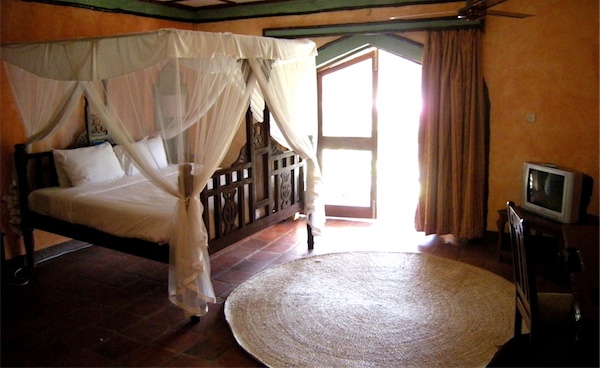Everywhere you go in Tanzania, there are nets. Mosquito nets. And not just here at the comfortable Zanzibar Beach Resort, where we stayed one night, but every little accommodation place we saw throughout the country. They’re serious about nets.
To be honest, at first I thought it was a just a bit of Africana for the tourists — hey, a four-poster bed certainly makes you feel like you’re somewhere different, right? But not so.
One morning in Dodoma, the ActionAid Australia campaigner travelling with me, Lena Aahlby, asked whether I’d bothered using the mosquito net. “No,” I said. “It’s dry, there weren’t any mosquitoes around, so I didn’t bother.”
Despite the scary warnings in my little travel medicine book, I hadn’t bothered with insect repellent either.
But our Tanzanian colleague Albert Jimwaga leapt in. “Oh, you’ve got to use the mosquito nets,” he said, a genuinely worried tone in his voice. “It doesn’t matter if you can’t see any mosquitoes, because they only come out late at night. You have to use the nets!”
It turns out this wasn’t just polite concern for his overseas visitors.
In Tanzania and other African nations, the threat from malaria is real.
As Abdul Kajumulo points out, malaria kills more than 100,000 infants annually, and attacks between 16 and 18 million people countrywide each year. That’s around 45% of the population. And that’s despite Tanzania having a decent anti-malaria strategy, apparently.
For my brief stay in country, spending AUD 30 for a month on gut-churning Doxycycline is a viable prevention strategy. But poor rural peasants only earn AUD 120 a year, so many malaria cases go untreated — with an obvious toll on individuals, families and the economy.
And then there’s dengue fever, for which there’s no vaccination and no cure.
I now have real respect for the humble mosquito net. I can see why, when there’s flooding or other cause for human displacement, a truckload of mosquito nets is high on the agenda.
[Disclaimer: Stilgherrian was in Tanzania as a guest of ActionAid Australia. His opinions do not necessarily represent the views of that organisation or its international affiliates.]

